6 weeks pregnant - signs, fetal development and what to consider
It's time to visit your GP...
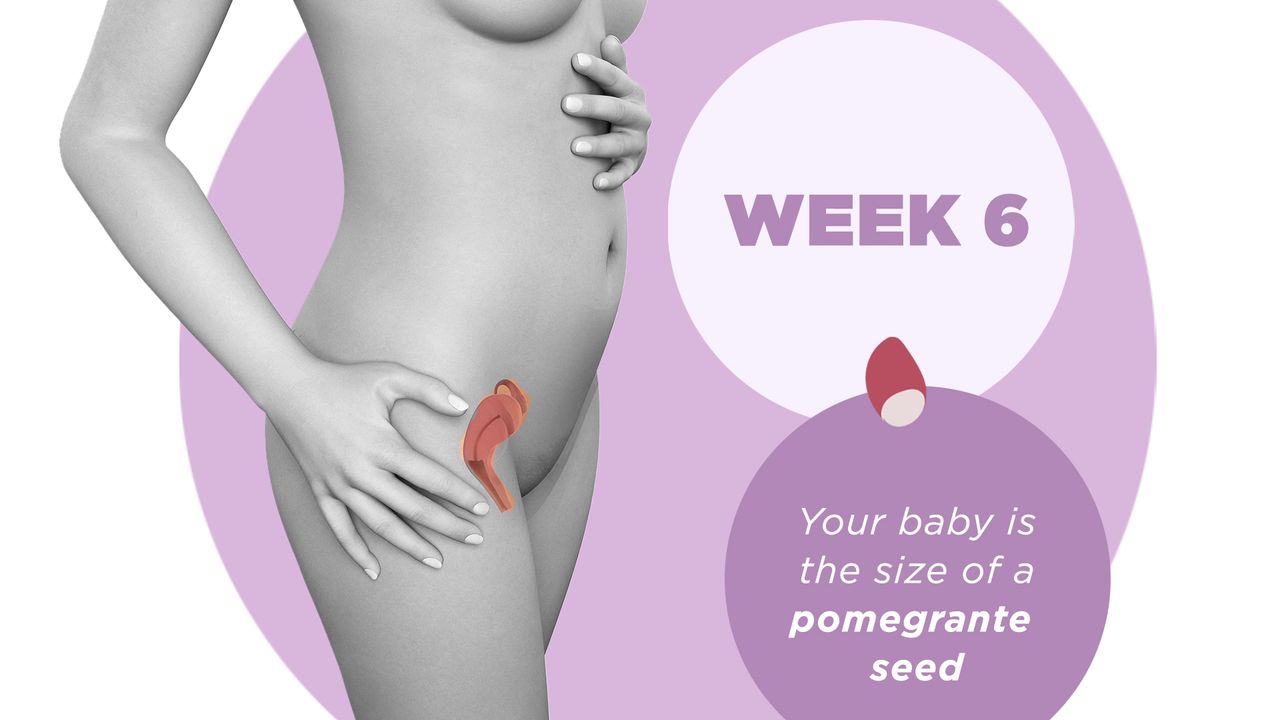
Mood swings, fatigue and constant trips to the toilet sound familiar? You're probably 6 weeks pregnant and a trip to you GP is in order... Keep a close eye on your pregnancy week by week with our handy guide.
When you hit 6 weeks pregnant, you're still in the early stages of pregnancy and the uterus is the size of a small pear. By the end of the 40 weeks, just before you deliver the fruits of your womb, it'll be the size of a large watermelon.
Symptoms at 6 weeks pregnant
Congratulations! You're officially pregnant and you're over the moon. Even though it's early days, the first signs of pregnancy may start to appear. Mood swings are common in early pregnancy so you may find you're quick to tears or tantrums. Your breasts might feel heavy, tender and sore and you'll need to pee with annoying frequency.
Tiredness can hit you like a freight train. We all know what it's like to feel weary after a few late nights, but the exhaustion you experience with early pregnancy is on a whole other level. When you're newly pregnant it can feel as though you've hit a wall of tiredness and the daily grind can really get you down. The only thing you can do is surrender to it and that means plenty of early nights.
That said, flagging energy levels can receive a much-needed boost with just 10 or 15 minutes shut-eye. But don't nod off for longer than 20 minutes or you may wake up feeling worse than ever. Fresh air, gentle exercise and avoiding sugar can also help you recover from a bad night's sleep during pregnancy.
Fetal development at 6 weeks pregnant
Week 6 is one of rapid growth. Your baby lies peacefully in the amniotic fluid but there's a lot going on. They're only 2-4mm long and yet by just 28 days after conception the neural tube along their back will have closed. Their tiny heart is beating rhythmically at around 80 beats a minute, pushing blood cells through the tiny vessels that supply them with the oxygen and nutrients to help them develop. Other organs starting to make an appearance this week include the spleen, gall bladder and pancreas. The beginnings of their face and neck are starting to emerge, tiny ears are starting to grow and arm buds and a tail are visible.
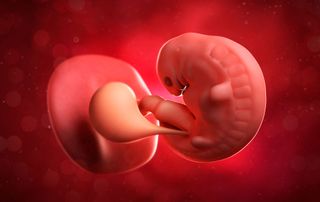
The changes to consider at 6 weeks pregnant
Once you've had a positive pregnancy test, visit your GP who will work out your estimated due date and give you information on keeping you and your baby healthy. This will include advice on taking the right amount of folic acid and vitamin D supplements and guidance on lifestyle factors that may impact on the health of your baby such as smoking, recreational drug use and alcohol.
GoodtoKnow Newsletter
Parenting advice, hot topics, best buys and family finance tips delivered straight to your inbox.
They will also chat to you about healthy eating options in pregnancy and the importance of food hygiene. Your doctor may also take a medical history and make you a booking in appointment for a few weeks' time.
After your GP has taken a detailed family history you may be offered a simple blood test to screen for Sickle Cell Disorder and Thalassaemia. These are inherited blood conditions that can have very serious health implications for your baby. They mainly affect people who originate from Africa, the Caribbean, the Middle East, Asia and the Mediterranean, but are also found in the northern European population.
If the blood test shows that you are a carrier of one of these conditions, then your baby's father will be invited for a blood test. If he is also a carrier there's a one in four chance that your baby is affected, so you will be offered a diagnostic test to find out. This is most likely to be a test known as Chorionic Villus Sampling that is usually carried out at around 11 weeks.
Further advice and information:
- Visit the NHS for more pregnancy week by week advice
- Download a pregnancy tracker app
- View all our pregnancy week by week guides
Anna Bailey has been the editor of GoodtoKnow since 2018. Before joining the team she was Features Editor at MSN UK, where she oversaw Family Health and Days Out. Previously, she was Digital Lifestyle Editor for the broadcaster UKTV, and Lifestyle Editor for ITV.com. Anna studied Multi-Media Journalism at Bournemouth University and went on to gain her NCTJ and NCE journalism qualifications. Anna is responsible for driving the direction and editorial strategy of Goodto. A mum and experienced baby product tester, she is passionate about providing safe, trustworthy, and relatable advice for families of all kinds.
-
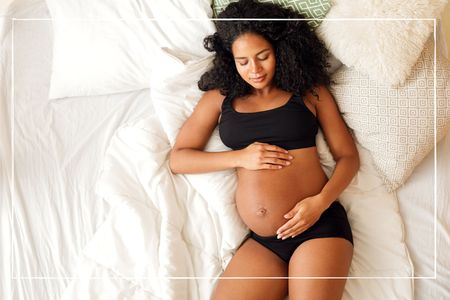 Pregnancy week by week guide
Pregnancy week by week guideEverything you need to know when you're expecting
By Stephanie Lowe Published
-
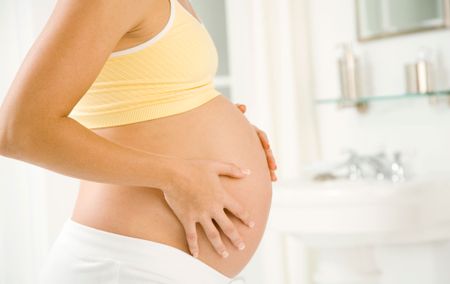 Week by week pregnancy guide: 32 weeks pregnant
Week by week pregnancy guide: 32 weeks pregnantYour baby is starting to grow very fast...
By Stephanie Lowe Published
-
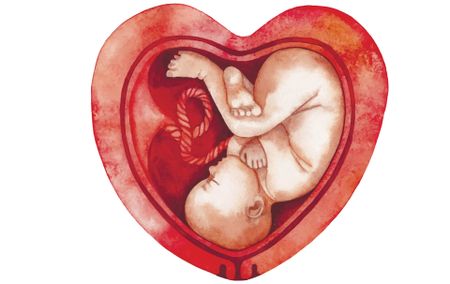 Week by week pregnancy guide: 33 weeks pregnant
Week by week pregnancy guide: 33 weeks pregnantEverything you need to know about being 33 weeks pregnant
By Stephanie Lowe Published
-
 Week by week pregnancy guide: 30 weeks pregnant
Week by week pregnancy guide: 30 weeks pregnantHere's everything you need to know...
By Rosie Conroy Published
-
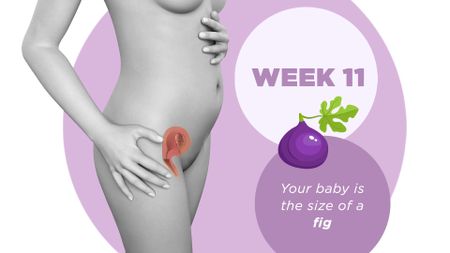 11 weeks pregnant - symptoms, fetal development and what to consider
11 weeks pregnant - symptoms, fetal development and what to considerWelcome to your second trimester...
By Anna Bailey Published
-
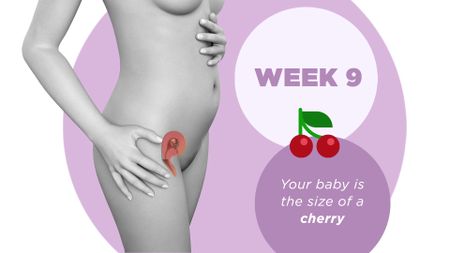 9 weeks pregnant - symptoms, fetal development and what to consider
9 weeks pregnant - symptoms, fetal development and what to considerGreasy hair? Acne? Sickness? Sore boobs? Fatigue? Welcome to 9 weeks of pregnancy
By Anna Bailey Published
-
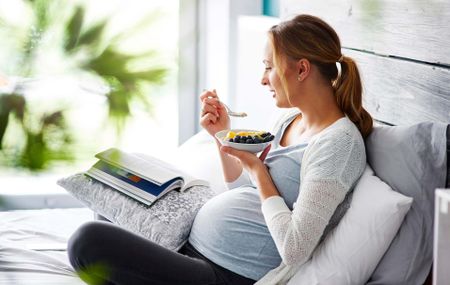 Pregnancy calendar: Your pregnancy timeline
Pregnancy calendar: Your pregnancy timelineJust found out you're pregnant? Don't miss out on any important milestones with our guide...
By GoodtoKnow Published
-
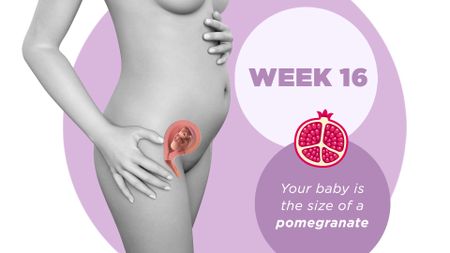 16 weeks pregnant - symptoms, fetal development and what to consider
16 weeks pregnant - symptoms, fetal development and what to considerIncluding your baby's development...
By Anna Bailey Published